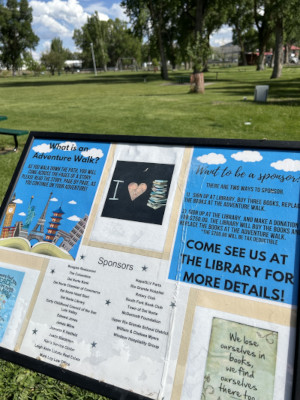You are here
Community Engagement
Outcome
The community is strengthened by a library that addresses the needs, interests, and aspirations of all of those they serve. Library affiliates (Friends and/or foundation organizations) are aligned to strengthen the connections between the library and the community.
Overview
The public library can be a hub for a vibrant community, serving as a central connecting place and offering space for discovery and community engagement. Through these community connections, the library stays informed and addresses community interests and opportunities.
The public library contributes to the economic health of the community, collects the memories of the community, and provides a place where people can explore, create, learn, meet, connect, become informed, share ideas, and be transformed. The library is a vital community asset with locally driven priorities.
The library governing authority, director, and staff engage with other community organizations, including other libraries, governmental agencies, nonprofit organizations, and the private sector to meet the library’s mission.
By conducting outreach and embedding library services in the community, the library engages diverse audiences to make informed choices on vital offerings. In turn, these acts demonstrate the value of the library and may lead to more community engagement, support, and funding.
Community leaders and members that engage with the library are essential to its success. Community volunteers who fundraise, advocate, or support library initiatives in other ways help to sustain a strong community-centered library.
The library may have a “Friends” group and/or a foundation that assists the library with fundraising, advocacy, and outreach in the community. Resources from these organizations supplement rather than replace the library’s operating budget, adding support while aligning with the library’s strategic priorities.

Community Engagement Essentials
Checklist for All Colorado Public Libraries
Community Connections
- Collect, organize, and provide information about diverse community groups and services so that all may experience a sense of belonging in the library.
- Embrace the importance of community-wide connections by meeting with and supporting local partners and groups.
- Establish cooperative agreements between the library and other agencies for shared programs and services.
- Define the library’s role in community crisis situations, working with local agencies on contingencies for various crises (flood, file, snow, pandemic. etc.) in which the library has essential roles.
- Participate as an active member, convener, and leader of community groups and initiatives that further community priorities.
- Collect and use community demographics, library use statistics, library impact stories, and other quantitative and qualitative data to improve services and communicate impact and library relevance.
Volunteers, When Applicable
- Recruit, train, and supervise volunteers to assist, not replace, staff. Using clear job descriptions, ensure training includes skill development on volunteer duties and applying the core values of librarianship, the library’s values and mission, and cultural competencies.
- Define volunteer recruitment and engagement with a written volunteer policy that includes the requirement of background checks for all volunteers.
- Ensure that a staff member is responsible for volunteer coordination, scheduling, and recognition.
Community Engagement Essentials +
Checklist for larger libraries
Community Connections
- Involve library Friends and other community members in the library’s long-range plan development and fundraising activities.
- Initiate and sustain connections with diverse groups through outreach and targeted services. Reach a wide range of community entities and individuals with diverse viewpoints to maintain positive associations with the library, its services and impact.
- Provide language support, as needed, for programs, discussions, and community assessment, including sign language, large print, multilingual content, etc. to ensure all have access and the ability to provide input.
- Facilitate or contract with a trained facilitator to convene community conversations about issues that are important to the community, sparking civic engagement, establishing civil discourse, and leading to positive community outcomes, such as stronger connections.
- Invite partners to collaborate to address community needs with multiple resource streams and from multiple perspectives. Participate in (or convene) cooperative planning and programming with community groups. Share associated costs when feasible.
- Establish mechanisms for library staff to participate on community commissions, boards, neighborhood groups, organizations, and chambers for community building and leadership development.
- Collect statistics and conduct evaluation, such as customer use and satisfaction surveys, community studies, observations, focus groups, interviews, and other means appropriate to assess and improve library services and resources for all.
Volunteers, When Applicable
- Create opportunities for community groups and/or businesses to participate in volunteer activities and other fundraising that benefit the library.
- Maintain a Friends group or foundation (501(c)3) that meets on a regular basis with a library staff liaison present as well as reporting structure to the library board. Follow the national guidelines for the role of each organization, including written agreements.
- Establish written distinctions about the responsibilities of the Friends group or foundation as needed, and keep funds raised by these groups separate; do not mix funds with library operating expenses when accounting for revenue and expenditures.


Connect With Us





